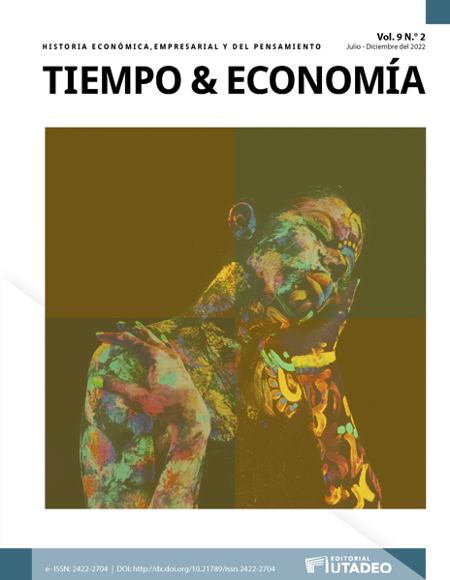
Esta obra está bajo una licencia internacional Creative Commons Atribución-NoComercial-CompartirIgual 4.0.
Esta obra está bajo una licencia internacional Creative Commons Atribución-NoComercial-CompartirIgual 4.0.
Resumen
Nowadays, adopting an organizational approach focused on sustainable practices aimed at promoting the responsible use of resources can represent a competitive advantage for companies, which can thus keep costs low and reputation high. An example of a company that adopts this approach is Petróleos Mexicanos (PEMEX). For this research, an analysis of the external management structure of the company –whose Interest Groups includes indigenous communities, civil society, government, media, suppliers and customers— was carried out based on the information provided on its website. The evaluation of the organization’s performance in terms of its relationship with relevant stakeholders includes the annual reports provided by the company, using a matrix that includes the results obtained each year in terms of stakeholder management. The results show a decreasing tendency of the company on its investment in socially responsible practices, which contradicts the justification of such investment to promote and boost the competitive advantage of the company.
Citas
Argandoña, A. (2011). STAKEHOLDER THEORY AND VALUE CREATION. Ctra. de Castilla, 3(5), 180–28023. https://www.iese.edu/research/pdfs/di-0922-e.pdf
BCG. (2012). Stakeholder Management - How Much Relationship Capital Do You Have. https://www.bcg.com/documents/file119020.pdf
Carroll, A. B. (1995). Stakeholder thinking in three models of management morality – A perspective with strategic implications. Understanding Stakeholder Thinking, (May 2015), 47–74.
Eniola, A. A., & Entebang, H. (2015). Government Policy and Performance of Small and Medium Business Management. International Journal of Academic Research in Business and Social Sciences, 5(2), 2222–6990. https://doi.org/10.6007/IJARBSS/v5-i2/1481
Esparza, S., & Martínez, J. (2019). The shared benefit approach to competitiveness. Mercados y Negocios, 1(39), 66–85. https://doi.org/10.1016/j.it.2011.10.005
Fontaine, C., Haarman, A., & Schmid, S. (2006). The Stakeholder Theory. Management, 1(December), 37–44. https://doi.org/10.1057/9780230524224
Freeman, E., Harrison, J., Hicks, A., Parmar, B., & Colle, S. de. (2010). Stakeholder Theory: The state of the art. https://doi.org/10.1017/CBO9780511815768
Freeman, E., & McVea, J. (2001). A Stakeholder Approach to Strategic Management. SSRN Electronic Journal, (March 2018). https://doi.org/10.2139/ssrn.263511
Freeman, R. E. (2017). Five Challenges to Stakeholder Theory: A Report on Research in Progress (pp. 1–20). https://doi.org/10.1108/S2514-175920170000001
Grove, H., Clouse, M., & Xu, T. (2020). Stakeholder capitalism strategies and opportunities for corporate governance. Journal of Governance and Regulation, 9(4), 59–68. https://doi.org/10.22495/jgrv9i4art5
Guruvaiah, N., & Rao, M. B. (2013). Corporate Social Responsibility and Social Development Role of business organizations in globalization era. IOSR Journal of Humanities and Social Science, 24–32. http://www.iosrjournals.org
Herrera Madueño, J., Larrán Jorge, M., Martínez Conesa, I., & Martínez-Martínez, D. (2016). Relationship between corporate social responsibility and competitive performance in Spanish SMEs: Empirical evidence from a stakeholders’ perspective. BRQ Business Research Quarterly, 19(1), 55–72. https://doi.org/10.1016/j.brq.2015.06.002
Humphrey, O. (2016). Sustainable Corporate Social Responsibility in the Development of Marginal Oil Fields in Niger Delta. International Journal of Innovative Research and Development, 5(4), 7. http://www.ijird.com
Kirat, M. (2015). Corporate social responsibility in the oil and gas industry in Qatar perceptions and practices. Public Relations Review, 41, 438–446. https://doi.org/10.1016/j.pubrev.2015.07.001
OECD. (2017). Enhancing the Contributions of SMEs in a Global and Digitalised Economy. Meeting of the OECD Council at Ministerial Level, (June), 1–24. https://www.oecd.org/mcm/documents/C-MIN-2017-8-EN.pdf
Osa, E. (2014). Corporate Social Responsibility and Chinese Oil Multinationals in the Oil and Gas Industry of Nigeria: An appraisal. Cadernos de Estudos Africanos, (28), 23. file:///C:/Users/Saúl Alfonso/Downloads/cea-1704.pdf
PEMEX. (2013). Sustainability Report 2013. http://www.pemex.com/en/responsibility/sustainable/reports/Documents/IRS_2013_eng.pdf
PEMEX. (2016). Sustainability Report 2016. http://www.pemex.com/en/responsibility/sustainable/Documents/20171123_IS_2016_ENG_FINAL_assurance letter.pdf
PEMEX. (2017). Sustainability Report 2017. http://brandirectory.com/league_tables/table/global-500-2017
Roh, T. H. (2016). The Sharing Economy: Business Cases of Social Enterprises Using Collaborative Networks. In Procedia Computer Science (Vol. 91, pp. 502–511). https://doi.org/10.1016/j.procs.2016.07.129
SEC. (2020). FORM 10-K ANNUAL REPORT PURSUANT TO OF THE SECURITIES EXCHANGE: PEMEX. 20-F.
Sinclair, M. L. (2011). Developing a Model for Effective Stakeholder Engagement Management. Asia Pacific Public Relations Journal, 12(2).
Spence, D. B. (2010). Corporate Social Responsibility in the Oil and Gas Industry: The Importance of Reputational Risk. Chicago-Kent Law Review, 86(1), 59–85. https://doi.org/10.1525/sp.2007.54.1.23.
Tuodolo, F. (2009). Corporate social responsibility: Between civil society and the oil industry in the developing world. Acme, 8(3), 530–541.
UNDP. (2017). Mapping the Oil and Gas industry to the Sustainable Development Goals: An Atlas. http://www.undp.org/content/dam/undp/library/Sustainable Development/Extractives/For Comment_Mapping the Oil and Gas industry to the Sustainable Development Goals - an Atlas_Feb2017.pdf

 PDF (English)
PDF (English)
 FLIP
FLIP












